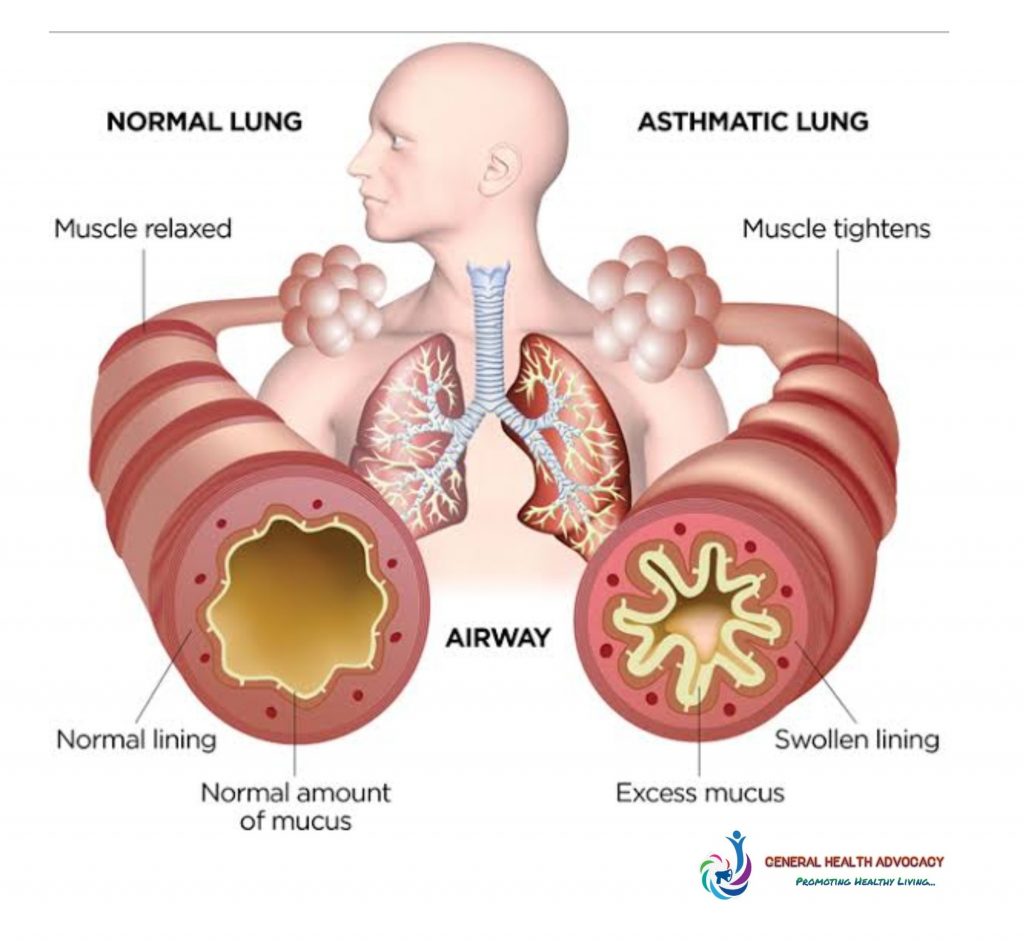
Asthma is one of the major Non-communicable diseases. It is a chronic disease of the the air passages of the lungs which inflames and narrows them. “It is a major noncommunicable disease characterized by recurrent attacks of breathlessness and wheezing, which vary in severity and frequency from person to person.”
Symptoms
Asthma symptoms vary from person to person. You may have infrequent asthma attacks, have symptoms only at certain times such as when exercising or have symptoms all the time.
Asthma signs and symptoms include:
- Shortness of breath
- Chest tightness or pain
- Trouble sleeping caused by shortness of breath, coughing or wheezing
- Coughing or wheezing attacks that are worsened by a respiratory virus, such as a cold or the flu
Signs that your asthma is probably worsening include:
- Asthma signs and symptoms that are more frequent and bothersome
- Increasing difficulty breathing (measurable with a peak flow meter, a device used to check how well your lungs are working)
- The need to use a quick-relief inhaler more often
Causes of Asthma
It isn’t clear why some people get asthma and others don’t, but it’s probably due to a combination of environmental and genetic (inherited) factors.
See Also
Impact of Environmental Pollution and Climate Change to Our Health and Ecosystems
Exposure to various irritants and substances that trigger allergies (allergens) can trigger signs and symptoms of asthma which can include :
- Airborne substances, such as pollen, dust mites, mold spores etc.
- Respiratory infections, such as the common cold
- Physical activity (exercise-induced asthma)
- Air pollutants and irritants, such as smoke
- Certain medications, including beta blockers, aspirin, and naproxen (Aleve) etc.
- Strong emotions and stress
- Gastroesophageal reflux disease (GERD), a condition in which stomach acids back up into your throat.
Risk factors
A number of factors are thought to increase your chances of developing asthma. These include:
- Having a blood relative (such as a parent or sibling) with asthma, Being overweight,
- Being a smoker,
- Exposure to secondhand smoke,
- Exposure to occupational triggers, such as chemicals used in farming, hairdressing and manufacturing.
Complications
Asthma complications include:
- Signs and symptoms that interfere with sleep, work or recreational activities
- Sick days from work or school during asthma flare-ups
- Permanent narrowing of the bronchial tubes (airway remodeling) that affects how well you can breathe
- Emergency room visits and hospitalizations for severe asthma attacks.
Proper treatment makes a big difference in preventing both short-term and long-term complications caused by asthma.
Prevention
While there’s no way to prevent asthma, by working together, you and your doctor can design a step-by-step plan for living with your condition and preventing asthma attacks.
- Follow your asthma action plan: Asthma is an ongoing condition that needs regular monitoring and treatment. Taking control of your treatment can make you feel more in control of your life in general.
- Monitor your breathing: You may learn to recognize warning signs of an impending attack, such as slight coughing, wheezing or shortness of breath.
- Identify and treat attacks early: If you act quickly, you’re less likely to have a severe attack. You also won’t need as much medication to control your symptoms.
- Take your medication as prescribed.
2 Comments